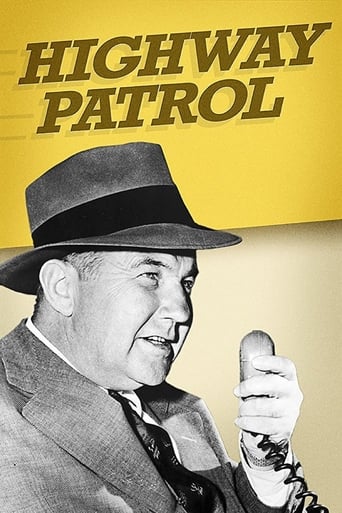dougdoepke
Good action series from the 50's. There were a number of law enforcement programs at the time, Dragnet, The Line-Up, State Trooper, et al. Highway Patrol, however, lasted four years, an unusual span amidst its many competitors. Success certainly didn't come from a telegenic leading man. In fact, I doubt Crawford would have had a shot without the name recognition that an Oscar afforded. Still, his aggressively bluff manner was perfect for the commander's role. To my knowledge, unlike some series (Dragnet), Patrol made no claim to be based on actual cases. Thus writers had free reign.The 50's was a popular decade for cars of all kinds. I expect another reason for success was action on the highways, where speed and skill prevail. A typical episode included riveting chases or some kind of speedy action. Never mind that highway locations seldom left greater LA with its non-scenic scrublands and mountains. On the other hand, city scenes were usually shot on location as well. Part of the series appeal, I think, came from consistent use of locations, showing 1950's styles and car models.Plots were usually unremarkable, mainly the kind of kernel (escapes or pursuits of some sort) that drew in Mathews and the Patrol. Generally, casts didn't include name actors or celebrities. That way focus remained on the story and action rather than actors. Even though the series remains mainly a period piece, there's enough entertainment value to keep modern audiences tuning in, as I do. As Mathews would say, "10-4".
bkoganbing
20 years before Erik Estrada and Larry Wilcox started issuing tickets to motorists on California's highways, we had the Highway Patrol series that starred Broderick Crawford for four years. His role of Inspector Dan Matthews became one of two signature roles for him, the other is his Oscar winner from the big screen Willie Stark in All The King's Men.This man was a criminal investigator and he commanded searches for criminals on California's highways. Be it looking for a radioactive part or a fleeing fugitive Matthews was out on the job directing the CHIPS officers in whatever case he was assigned.Crawford's style was no nonsense, a lot like Jack Webb without the staccato speech pattern. The half hour stories were mini- documentaries unto themselves. And in those more innocent days, Crawford always nailed his quarry.I'm surprised no one ever revived this on the big or small screen.
csimpkins53
I've always thought it to be very interesting that all of the guest stars whether they be criminals or victims all drive exactly the same make and model of car. This is especially noticeable in the episodes made in about 1958. All of the cars used by criminals and victims are Plymouth Furys. Some are convertibles, some are sedans but they are always Plymouth Furys. This is a bit ridiculous as in reality criminals and victims in 1958 as well as any other modern year would have used a multitude of different types of vehicles. Granted, in 1958 the selection of vehicles may have been a bit less, but still, there were Buicks, Chevys, Pontiacs, Cadillacs, Olsmobiles, Fords, Mercurys, Lincolns, Ramblers, Chryslers, Dodges, etc. and all of the various models produced by each. For the show to assume that ALL criminals and victims would drive Plymouth Furys is simply ridiculous and unbelievable.
illusiondweller
There has been much fun made of the part played by Broderick Crawford---and much denigration accorded the show in general. I have a complete collection of the series. I watch them when I need a fix from the current workaday world of crime now overwhelming law-enforcement...and the courts allowing it to happen. Crawford, whose mom and dad worked the Vaudeville circuit, was a very talented and forceful visage in "Highway Patrol". One didn't have to look like Clark Gable in order to portray a dedicated cop. No, he wasn't pretty. Yes, he looked like an unmade bed. But, that just added authenticity to the show in my 15-19 year old (at the time) eyes.I would have hated being interrogated by him even if I hadn't done anything wrong. Think about how much more latitude the first line of law-enforcement had during that show's time. It started four years before the passage of the Miranda Act. Folks who got too chirpy with "the law" in those days, learned a pretty good lesson before they even got locked up. Wish it still held true. Buddy Buchanan
